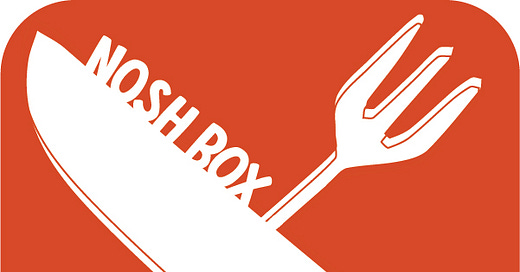It's time to dig deeper than "food is political"
Issue 182: Saying a food writer is political “is a dog whistle for ‘rocks the boat’ or, in other cases, ‘isn’t white,’” writes Alicia Kennedy.

Hello! Welcome to Nosh Box, a lunchtime-ish food newsletter that recognizes the ways in which the traditional conception of “objectivity” centers and universalizes the straight, white, and male experience.
Read last Thursday’s dispatch: Stop associating pineapples with being “Hawaiian”
As usual, food writer Alicia Kennedy’s Monday morning essay, sent out weekly via her newsletter, is on point today. I’ve referenced her newsletter before; a few weeks ago, she wrote about how the rhetoric of “immigrants feed America” can actually, paradoxically, be deployed to reinforce the status of migrants as farmworkers, feeders, invisible deliverers of “authentic” culture.
Today, she tackles a similar platitude — “food is political.” She writes:
People respond to that phrase with a sense of solemn duty, without defining what the politics are and minimal acknowledgement of how food’s politics manifest in the world. I am constantly asking myself: What the hell does anyone mean when they say “food is political”?
The phrase “food is political,” she argues, is used as a way to acknowledge that food carries deep meanings (and to display one’s social-justice bona fides) while eliding any sort of meaningful consideration of the history of oppression wrapped up in those deep meanings.
Food is political because government policy could be used to make sure everyone has access to affordable and healthy food, but it’s not. Food is political because the humanity of the people who make it has seemingly become an open question among elected officials. Food is political because we have metamorphosed the moral obligations of living in an equitable and kind society — anti-racism, anti-colonialism, ending poverty and food insecurity, wearing a mask during the pandemic, etc. — into public debates with two equally weighted “sides.”
She digs in further on the subject of labelling food writers who cover these issues “political”:
I find it so dull that any non-cishet white identity becomes shorthand for “politics” with little interrogation as to why that is tokenizing. Some BIPOC food writers never write a word about politics. Do they have to?
I would rather people say, “Alicia Kennedy is an anti-racist, anti-capitalist food writer” than “Alicia Kennedy is a political food writer.” One of these sentences means something; the other is a dog whistle for, “rocks the boat” or, in other cases, “isn’t white.” Neither of these connotations does my work justice.
When the baseline stops being the cishet white men, we can also stop pretending that being political means having an identity that doesn’t align with the mainstream. We can maybe have real discussions about power, labor, capital, and the various ways in which they manifest because of racism, sexism, and colonialism.
You can (and should!!) read the full essay, “On Politics,” here.



